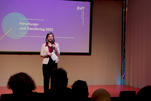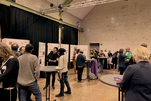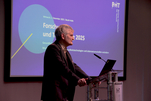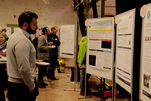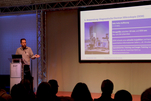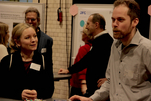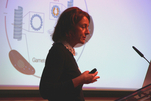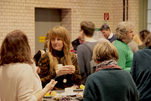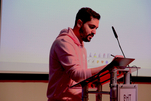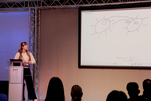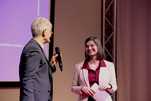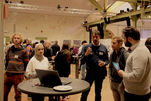Research and Transfer Day 2025
How are robotics, AI, and VR changing health technologies and life sciences? And what potential do these technologies offer for diagnostics, healthcare, and fighting diseases? These questions were the focus of the third Research and Transfer Day at the Berlin University of Applied Sciences (BHT).
"We do research to make the world a better place for people," said Vice President for Research and Transfer Prof. Dr.-Ing. Joachim Villwock in his opening speech. This is especially true in the healthcare field. The program for the Research and Transfer Day and the poster exhibition therefore focused, among other things, on how machine learning can be used for more accurate diagnoses and how robotics can assist in surgical procedures. The guests were guided through the day by the host Prof. Dr. Yasmin Olteanu (Department I).
Machine learning and infection research
Dr. Nils Körber started the event with a technical presentation. Körber is the deputy director of the Center for Artificial Intelligence in Public Health Research (ZKI-PH) at the Robert Koch Institute, which was founded in 2021. There, large amounts of unstructured data are evaluated using machine learning to gain new insights for public health. For example, it can be used to understand how invasive species, such as the tiger mosquito, are spreading as a result of climate change, or how excess mortality is developing as a result of heat waves.
Körber presented two examples from the field of image analysis, drawing on the institute's extensive research portfolio. First, he explained the work with image data from electron microscopy. With its very high resolution of less than two nanometers, electron microscopy allows laboratory samples from patients to be examined for different viruses. The institute uses this image data to train an AI model that can recognise viruses and tell them apart.
In the field of live cell microscopy, artificial intelligence is used in infection experiments. It recognizes how many cells are visible, where they are located, and whether they are infected. This helps to understand how an infection spreads. “We use AI methods and image analysis to automate laboratory applications in order to identify characteristics that are very difficult to identify and make quantitative statements,” summarizes Körber. "For AI methods, it doesn't matter whether they analyze 10,000, 100,000, or 1,000,000 cells or viruses. For humans, however, this involves a great deal of manual effort. We will reduce, simplify, and ultimately accelerate this process."
Spotlighting the cell
Prof. Dr. Simone Reber (Biochemistry, Department V) then gave a keynote speech on the mechanistic origins of cellular geometry. Her research investigates how cells are organized internally and how they are assigned their respective functions—for example, as heart, skin, or muscle cells. Her presentation focused on two organelles: the cell nucleus, which contains and protects genetic information, and the mitotic spindle, which is responsible for dividing chromosomes during cell division.
Reber grouped three research questions around these organelles. The first: How stiff do microtubules have to be? Microtubules are structures made of the protein tubulin and are among the largest components of the cytoskeleton. The stiffness of microtubules is important in malaria research. This is because the parasite's cell needs to be stiff enough to infect a human cell. These findings could help to develop new drugs. The team is also researching the length of the mitotic spindle. To see how cells behave during mitosis, the team trained their microscopes to recognise cell division, record it, and analyse the image data automatically. "From this data, we can read everything that interests us, including how long the spindle is," says Reber. This is important because the mitotic spindle is very likely to change due to mutations. Reber's team is also using smart microscopes to look at a third question: How dense is the cell nucleus? The density determines how molecules move and interact with each other in the cell nucleus. This is important for diagnosing cancer, for example. Machine learning also speeds up the process of investigating these questions.
Science in a nutshell
Afterwards, scientists from BHT presented their work in science pitches, with just 120 seconds to get to the heart of their research. For those who wanted to find out more, there was the opportunity to talk to the experts afterwards.
These topics were presented during the event:
- Antibiotic Resistance Gene Abundance and Transfer in Wastewater-Irrigated Soils, Dr. Leila Soufi
- Autonome Chirurgie: Wie KI-trainierte Roboter bei chirurgischen Eingriffen assistieren können, Prof. Dr.-Ing. Francisco Morales Serrano, Lama Albalkhi, M. Sc.
- BACAI: A Novel Multi-Modal Approach to Bacterial Resistance Analysis and Classification Using AI-Powered Microscopy, Dr. Amr Mostafa
- Bioprozessentwicklung zur Produktion von PHA-Bioplastik in Hochzelldichte Fed-Batch Kultivierungen, Prof. Dr.-Ing. Sebastian Riedel, Johannes Nicklisch, M. Sc.
- BHT-Forschungsverbund Data Science +X, Prof. Dr.-Ing. Alexander Löser, Dr.-Ing. Margret Becker
- Evaluating and Teaching Explainable Clinical Reasoning in NLP, Prof. Dr.-Ing. Alexander Löser, Conor Fallon, M. Sc.
- From Language to Motion: A Library of skills for LLM-controlled robots, Prof. Dr.-Ing. Hannes Höppner, Rafid Abyaad, M. Sc.
- BHT-Forschungsverbund HARMONIK: Humanoide Robotik und Mensch-Technik-Interaktion, Prof. Dr.-Ing. Ivo Boblan, Dr.-Ing. Margret Becker
- BHT-Forschungsverbund IMPACT: Interaction, Metabolism, Purification, Analytics, Co-Culture and Target-specific Drug-Design, Prof. Dr. Elisabeth Grohmann, Dr.-Ing. Daria Rybakova
- Machine Learning in Environmental Sciences, Prof. Dr. Felix Bießmann, Vipin Singh, M. Sc.
- Retrospektive: Biomechanische Bewegungsstudie im Human.VR.Lab der BHT, Prof. Dr.-Ing. Ivo Boblan, Lukas Strunz, M. Sc.
- Ringe der Macht: Wie sich Antibiotikaresistenzen zwischen Bakterien verbreiten, Prof. Dr. Elisabeth Grohmann, Michelle Bölcke, M. Sc.
- Spatial Configuration of Dual-Arm Visuo-Haptic Input Station: Improving Interaction and Usability, Prof. Dr.-Ing. Hannes Höppner, Ranjit Santhanaraman, M. Sc.
- Teleoperationssystem: Kostengünstige Teleoperation von humanoiden Roboterarmen mittels einer RGB-D-Kamera, Prof. Dr.-Ing. Ivo Boblan, Kevin Sommler, B. Eng.
- Uncertainty in XAI, Prof. Dr. Felix Bießmann, Teodor Chiaburu, M. Sc.
- VR-System zur KI-gestützten Annotation und Bereinigung von Punktwolken mit Anwendungen in Vermessung, digitalem Bauen und Maschinenbau, Prof. Dr. Kristian Hildebrand, Levente Hernádi, M. Sc.

